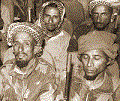The Firqat

The main purpose of the SAS in the Dhofar was to train and raise units of SEP's (Surrendered Enemy Personnel) This had been done before in Malaya and Kenya but in Dhofar the SAS brought this idea to new heights of success. The SEP units were called Firqats, the Arabic word for unit. Some of these SEPs had been trained in Russia, China, and South Yemen. Most guerrillas who changed sides to join the Firqats were unhappy with the brutality dealt out by the Communists by trying to stamp out religion and tribal loyalty. Some guerrillas soon realized that it would be better to be on the winning side and of course there was the prospect of loot, whether it be new weapons, watering rights, women or cattle. Between September 1970 and March 1971 a total of 201 Adoo had changed sides. By December 1975 the total had risen to over 800.

When a guerrilla came down from the djeble into a Firqat camp wanting to defect, the SAS team did not bother him and allowed him to keep his weapons. He was then encouraged to talk to other Firqats, some of whom may even be related to the guerrilla. It was not unheard of to find brothers, cousins and uncles to be fighting on opposing sides. After a few days the SEP would officially become part of the Firqat and would tell Arabic speaking members of BATT what ever they knew about the Adoo they had been fighting with. Some times the SEP surrender would be more dramatic. After the Battle of Mirbat, one Adoo arrived at a Firqat camp near Sudh and with him he brought the 6 assault rifles of his dead comrades.

Because there was no complete screening done of these SEP, some SAS men found themselves in dangerous situations where both SAS and Firqats eyed one another with safety catches off. The soldiers of the Sultan's regular army thought the SAS were mad to go in the mountains with men who had only recently been their enemy. SAS members achieved great camaraderie with their Firqats. Captain Simon Garthwaite was killed on 12th of April 1974 while trying to rescue a Firqat. The Dhofaris who made up the Firqats were very hostile to outsiders. They were well known in the Arab world for being difficult. There was an old Arab proverb which said if you find a Dhofari and a snake in your bed, throw the Dhofari out first.
The SAS trained the Firqats to use a large arsenal of modern weapons from grenades to mortars. Dealing with the Firqats proved to be very frustrating some times. Before any operation the Firqats would vote for which one of them would command. The SAS only trained and armed the Firqats and officially did not command them. Some times the Firqats would go on strike before or in the middle of a crucial operation. When this happened the Firqats would down arms and hold a "wigwam parliament" as the SAS called them to resolve the matter. Johnny Watts had a frustrating time during Operation Jaguar when the Firqats decided to take the day off!

The SAS learnt how to work with Firqats being careful not to upset the apple cart. On one occasion a SAS medic was removed from his Firqats because the Firqat leader had died from a heart attack while the medic was trying to heal him. The other Firqats may have blamed him for the death.



